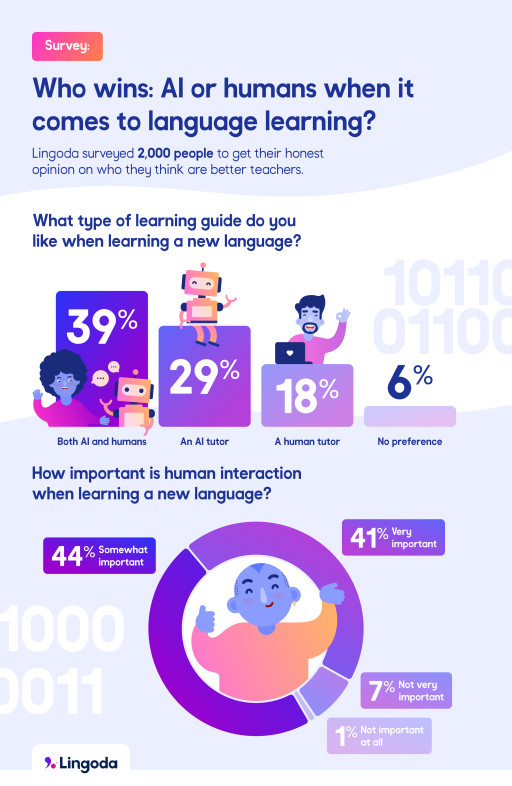
Survey Reveals Language Learner Preferences: Human Instructors vs. AI – Lingoda’s Findings
MIAMI, October 31, 2023 (Newswire.com) - The world of education is undergoing a profound transformation with the integration of Artificial Intelligence (AI). However, a recent survey conducted by Lingoda, the leading online language learning platform, reveals that language learners still place a high value on human interaction in the language learning process.
The survey, which encompassed the responses of over 2,000 adults in the United States, unveiled an overwhelming preference for human interaction among language learners. A staggering 85% of respondents indicated that they believe human interaction is either "very important" or "somewhat important" in new language learning experiences.
Key Findings:
- 85% of respondents consider human interaction essential in language learning.
- 39% of participants favored a combination of human and AI tutors.
- Only 8% of survey respondents believed that human interaction in language learning was "not very important" or "not important at all."
The study also delved into preferences across different age groups and genders. Younger learners, in the 18–24 age group, were particularly inclined towards human tutors, with 35% expressing a preference for human tutors only, as opposed to just 14% who favored AI-only learning. Importantly, respondents of all age groups displayed a preference for a combination of AI and human interaction, with the 45–54 age group showing a strong inclination towards an equal combination of both methods at 49%.
When it comes to the preferred approach to language learning, 39% of survey participants expressed a desire to learn a language with an equal combination of both human and AI tutoring.
Why Human Tutors Remain in Demand:
Despite the growing prevalence of AI in education, the survey results highlight the irreplaceable role of human tutors in the language learning process. Human tutors possess qualities that AI cannot fully replicate, such as the ability to empathize with students, identify when they are facing difficulties, and adapt their teaching methods accordingly. They provide students with a full immersion experience in the language and prepare them for real-world interactions.
While AI technology offers valuable support and enhances language learning, human teachers bring empathy, cultural insights, and interpersonal connections that are challenging for AI to fully replicate. The ideal language learning experience, as indicated by the survey, often involves a blended approach, where AI complements the efforts of human teachers. This combination provides students with a well-rounded and highly effective language learning experience.
In an era where technology is becoming increasingly integrated into our daily lives, the survey unequivocally affirms the enduring importance of human interaction in language education.
For more details and to access the full report, please visit Lingoda’s survey and research page.
ABOUT LINGODA
Lingoda is one of the top online language schools. Founded in Berlin, Germany in 2013, we provide convenient and accessible online language courses in German, English, Business English, French and Spanish to over 100,000 students worldwide. Visit Lingoda.com to learn more.
Contact Information:Susanne Börensen
International PR Manager
[email protected]
Original Source: Survey Reveals Language Learner Preferences: Human Instructors vs. AI – Lingoda's Findings
The post Survey Reveals Language Learner Preferences: Human Instructors vs. AI – Lingoda’s Findings first appeared on Regd News.
Technology - Regd News originally published at Technology - Regd News




 Despite the occasional headline about electric vehicle (EV) fires, data consistently shows that EVs are significantly less likely to catch fire than gasoline-powered cars. Several studies from around the world have confirmed that the fire risk for EVs is far lower than for vehicles using internal combustion engines (ICEs). This often surprises consumers, as media […]
Despite the occasional headline about electric vehicle (EV) fires, data consistently shows that EVs are significantly less likely to catch fire than gasoline-powered cars. Several studies from around the world have confirmed that the fire risk for EVs is far lower than for vehicles using internal combustion engines (ICEs). This often surprises consumers, as media […]

